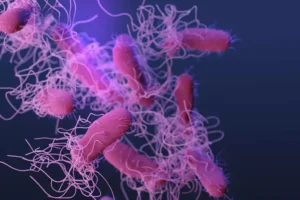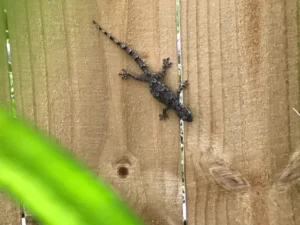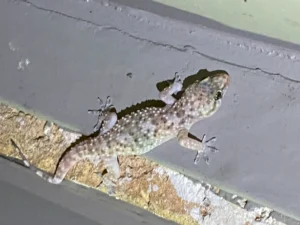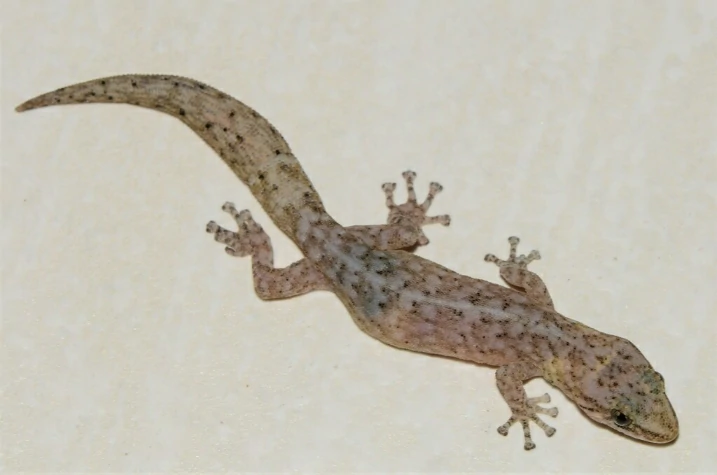You’re sitting on your couch at night, watching a small gecko crawl up the wall. It looks harmless, almost cute, but then a question pops into your head: do geckos carry salmonella?
Yes, geckos can carry salmonella, and the bacteria may spread through their droppings, skin, or anything they touch. This does not mean every gecko is dangerous. But it does mean you should be careful when handling geckos or cleaning areas where they live.
What Exactly Is Salmonella?
Salmonella is a type of bacteria that can cause an infection called salmonellosis in people.
You might feel stomach cramps, diarrhea, fever, or nausea if you get infected.

The bacteria spreads when you swallow it, usually by eating contaminated food or touching something that has it and then touching your mouth.
In animals like geckos, salmonella usually doesn’t make them sick. They can carry it quietly while people who get exposed might end up infected.
How Do Geckos Carry Salmonella?
Geckos can carry salmonella in their digestive system. The bacteria comes out in their droppings.
Once it’s in the environment, it can stick to their skin, feet, or anything they walk on.
For example, if a gecko walks across your kitchen counter, bacteria from its droppings could spread there.
If you then prepare food without cleaning the surface, you could end up swallowing it.
Is Every Gecko Dangerous?
Not every gecko has salmonella. Just like not every person carries the same germs, some geckos might not have it at all. But you can’t tell by looking at them.

Experts recommend treating all geckos as if they might carry it.
That’s why people are told to wash their hands after touching reptiles, even if they look healthy.
How Do People Get Infected?
Most people don’t get sick just by seeing a gecko on the wall. Infection usually happens when you come into direct contact with droppings, dirty surfaces, or the gecko itself.
Imagine this: a child picks up a gecko and then eats a snack without washing hands. Or someone cleans a gecko’s tank and then touches food.
These small actions are enough to spread salmonella.
Can Geckos Make Households Unsafe?
Usually, geckos aren’t a big danger if you know how to live with them safely. They tend to stay on walls and ceilings, away from food.

The real risk comes if you handle them a lot or keep pet geckos indoors without good hygiene.
Wild geckos that wander into homes are less likely to cause trouble if you don’t touch them and clean the areas they pass through.
Why Geckos Don’t Get Sick from Salmonella
It may seem weird that geckos carry salmonella but stay healthy. Their bodies are just adapted to live with these bacteria.
In reptiles, salmonella doesn’t cause the same problems it does in humans. It’s almost like it’s part of their normal biology.
What About Pet Geckos?
Pet geckos, like leopard geckos or tokay geckos, can also carry salmonella. Even if they’re born in captivity and never saw the wild, the bacteria might still live in them.
That’s why owners are always advised to:
-
Wash hands after handling geckos.
-
Keep gecko enclosures clean.
-
Avoid kissing or cuddling reptiles too closely.
-
Keep geckos away from kitchens and food prep areas.
These steps make sure salmonella doesn’t spread from pets to people.
Who Is Most at Risk?
Salmonella can infect anyone, but some groups are more likely to get seriously sick:
-
Babies and young children.
-
Older adults.
-
People with weak immune systems.
Even a small exposure can be serious for these groups. That’s why many health organizations recommend not keeping reptiles in homes with very young children.
Do Geckos Spread Salmonella Through the Air?
No. Salmonella doesn’t float through the air like a cold or flu. It only spreads through direct or indirect contact.
Seeing a gecko on the ceiling isn’t a risk unless you touch something it contaminated and then touch your mouth.
Are Wild Geckos in Homes a Problem?
In warm areas, wild geckos often sneak into houses. They hunt insects, stay near lights, and hide behind furniture. Many people live with geckos without ever getting sick.

The key is simple: don’t touch them, don’t let them crawl on food, and clean surfaces they pass through.
If you treat them with respect and caution, they’re usually more helpful than harmful because they eat pests like mosquitoes and flies.
How to Live Safely with Geckos Around
If geckos visit your house, here are easy tips:
-
Don’t touch them.
-
Keep them away from food or dishes.
-
Wipe down surfaces if you see droppings.
-
Wash hands after cleaning up.
Following these small steps lowers the risk of salmonella and still lets you enjoy the bug-control benefits geckos bring.
Do Geckos in the Garden Carry Salmonella Too?
Yes. Wild geckos outdoors can also carry it. If you garden or play where geckos live, wash your hands before eating.
It’s no different than washing after touching soil, pets, or outdoor tools.
Can You Get Rid of Salmonella in Geckos?
There’s no way to make a gecko completely free of salmonella. Antibiotics aren’t used for this because the bacteria are natural to reptiles and would come back anyway.
The focus is on stopping the spread through hygiene and smart handling.
Should You Be Afraid of Geckos?
Not really. Geckos aren’t aggressive, they rarely bite, and they’re not poisonous. Their link to salmonella is important, but it doesn’t make them dangerous if you take precautions.
Many cultures even see geckos as lucky or helpful because they keep insect numbers down.
How Serious Can Salmonella Infection Be?
For most healthy adults, salmonella infection means a few days of stomach upset that usually goes away on its own.
Still, it can be more serious in children, older adults, or people with weak immune systems. Rarely, it can spread beyond the intestines and need hospital care.
That’s why experts focus on prevention instead of fear. A little awareness goes a long way in staying safe.
Conclusion
So, do geckos carry salmonella? Yes, they can, but that doesn’t mean every gecko is dangerous. The key is understanding how it spreads and how to protect yourself.
If you don’t handle geckos, keep food areas clean, and wash your hands, the risk stays low.
Geckos can still be helpful little bug-hunters on your walls, as long as you respect their space and practice good hygiene.
Hi, my name is Ezra Mushala, i have been interested animals all my life. I am the main author and editor here at snakeinformer.com.

